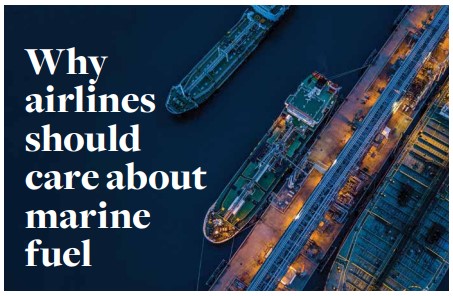
In June 2010, the International Maritime Organization (IMO) adopted ISO 8217, which mandates a reduction of the sulfur levels in marine fuel from 3.5% to 0.5% from January 2020 (IMO2020). It is estimated that more than half of the 87,000 active ships around the world are not yet compliant with ISO 8217, the equivalent of three million barrels a day or the total jet fuel consumption of European and US airlines combined. Cleary, refineries—and by extension the jet fuel they produce—could be significantly affected by IMO2020.
It could increase the crack spread, the difference in price between crude oil and the petroleum products the refineries extract from the oil by “cracking” oil’s long hydrocarbons into shorter, more useful chains. And every one US dollar per barrel increase in the crack spread pushes the aviation industry’s fuel costs up $2.5 billion. In short, IMO2020 could hike up the cost of jet fuel for every airline.
A lot depends on how shipping and the refineries decide to meet IMO2020. Ships could install scrubbers that clean up the sulfur emissions but not all scrubbers installed today are acceptable worldwide and the cost of a new one runs into the millions of dollars as well as time spent in dry dock. Refineries, meanwhile, may have to upgrade to deal with low sulfur production or deal more in “sweet” crudes, which require less production work. The former comes with considerable cost attached and the latter will push up the price of sweet crudes considerably. Producers of low sulfur shale oil and high complexity refineries will be rubbing their hands in excitement at the prospect of IMO2020. But airlines could join ship owners and low complexity refineries in regretting its negative cost impact.
There are a range of views on the eventual outcome of IMO2020. BP, Shell, and ExxonMobil have stated that they expect no shortage of compliant fuels, for example, and there are reports of as many as 300 scrubbers per month being installed. Others expect about a $4 per barrel increase in the jet fuel price. “I would sum it up this way,” says Patrick Callan, Chair, Commercial Fuel Working Group and Managing Director, Fuel Management, Delta Air Lines. “Uncertainty in the market leads to price volatility, which leads to excited traders. And excited traders lead to airlines paying the wrong price for jet fuel.”
Sources: https://www.iata.org/events/aff/Documents/IATA%20Airlines%20Daily_AFF%20Issue01.pdf

